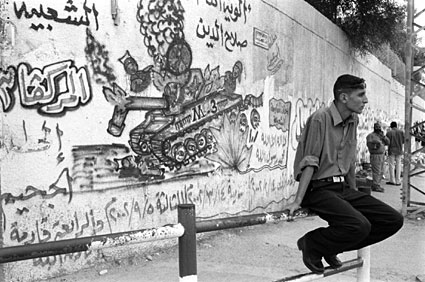
Photo: Darren Ell
|
 Photo: Darren Ell |
| Lily Saba, Gaza City, April 6:
|
|
Anyone visiting Gaza is bound to be struck by the size of the camps and the large number of refugees compared to original Gazan inhabitants (two thirds to one third). But coming from Lebanon I was struck by something else as well - the size and importance of UNRWA installations, Even in the camps, I was astonished to find large, imposing UNRWA buildings - schools, women's activities centres, centres for the handicapped, centres for youth. In camps in Lebanon you find nothing like this.
Conversations with UNRWA people convinced me that UNRWA had been and remains central to refugee life in post-1948 Gaza. This decided me to record a life story of a woman employee. It would reflect the history of UNRWA in Gaza and the special social status of its employees, neither ordinary refugees nor Gazan citizens. The first retired woman employee I tried to interview was guarded by a Gazan citizen husband, so fearful that he absolutely refused to allow his wife to record. As I leave he tells me, "Don't quote anything that 'Mary' has said", though his wife had hardly opened her mouth during my visit. Later, friends explain that people are afraid of the PNA which has plenty of spies around, and uses gossip to keep people in line. With Lily Saba I encountered no such problems. She was welcome itself, and her husband - a doctor - kept tactfully out of sight in his study. She became |
even friendlier when it turned out that I knew one of her brothers in Beirut - she has relatives and children scattered all over the world. She sat among their silver-framed photographs and the embroidered Palestinian cushions, and told her story without the slightest hesitation. Like so many Palestinian women I know, she gives you the impression she could run the world if given a chance - kind but fully aware of the rules, and with her feet on rock-solid ground. Doubtless the fact that she began to work at age 16 to help her family had something to do with her aura of competence. Retirement from work has given her more time for an NGO she founded and presides over, a club for university women graduates. It marks her ease in the 'public' sphere that she prefers to be photographed in the club rather than in her home. The fact that the Israelis closed the club and put her under house arrest during the first Intifada is a matter for pride. Nationalism underlies Lily's life story as a tone of voice rather than in words. Her story confirms my sense of UNRWA's importance in Gaza - she lived through the Israeli invasion of 1956, the Israeli occupation after 1967, and the first Intifada, partly because her UNRWA base supplied continuity and minimal protection.
Lily Saba begins her story: |
[Umm Sa'id Shmeis] [Umm al-Abed Shahada] Copyright©2005 |
|